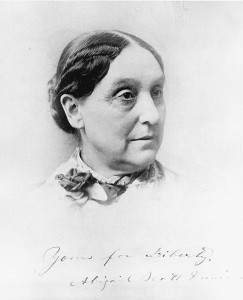Abigail Jane Scott Duniway of Oregon devoted more than four decades of her life to the cause of equal rights for women. With only a country schooling and six months at formal academy, and with responsibility for an invalid farmer husband and six children, Abigail nonetheless became a school teacher, milliner, businesswoman, author, journalist, and vigorous proponent of equal rights. Well-read, well-informed, and broadly interested in public issues, trends, and
reforms of the day, including abolition1, temperance, monetary policy, spiritualism, immigration, and party politics, Scott Duniway was concerned particularly about women’s economic plight. She fought for a woman’s right to own property in her own name and to secure that property from her husband and his creditors. She railed against unequal wages on the job and unpaid labor at home, urging that marriage be organized as a business.2 She objected to the moral double standard, early marriages of young girls, and debilitating “excessive maternity.”3 But above all, she toiled ceaselessly for that one right upon which, she believed, all improvements in women’s lot depended: the right to vote.4 To this end, Scott Duniway traveled, lectured, and wrote tirelessly.5
As one of the most public women of her day, particularly in the Pacific Northwest, Abigail Scott Duniway already is well-known to many. But largely inaccessible or missing from the historical record altogether are the primary documents that tell the story of her career. This site makes many of these documents available, so that interested readers may learn about her and her times from her own words.
The campaign for equal suffrage was comprised of more than characters and events, more than interest groups and political strategy, more even than ideologies and attitudes. It ultimately was a persuasive campaign, comprised of ideas and arguments, claims and counter-claims, justifications and appeals. Its characters were speakers (and writers) and audiences. Its events were rhetorical acts (speeches, editorials, leaflets, rallies, and so on). From this perspective, the question of central concern is: How did advocates craft messages (i.e., rationales in support of woman suffrage) that would convince (rather than alienate) the diverse audiences whom they sought to persuade?
Primary documents are essential in attempting to answer this question for two reasons. First, they are windows onto their creators’ understandings of their rhetorical situations. Speeches suggest the types of audiences that the speaker believes need convincing, as well as those audience characteristics (especially beliefs, attitudes, and values) that may both enable and constrain persuasion.6 Such texts also may suggest the speaker’s understanding of her own role as advocate. Second, primary documents are their creators’ strategic responses to their rhetorical situations. That is, such texts display the patterns of argument, language choices, value appeals, and other rhetorical devices that speakers believe are most efficacious under the circumstances.
Hence, the primary documents collected here help tell the story of Scott Duniway’s remarkable career as a public advocate. Further, because she was a woman in an era when the public sphere was reserved largely for men, Scott Duniway’s career testifies to the tenacity and inventiveness of the rhetorically disadvantaged. Appreciation of her accomplishments thus also contributes to the completion of the historical record.
NOTES
- Scott Duniway came from a long line of reformers and opponents of slavery. Her grandfather, James Scott (whose own mother came from Quaker stock), moved to the wilderness of central Illinois in 1824, and was followed by his family and a hundred or so relatives–transplanted Kentuckians all–principally for the purpose of freeing his slaves. A black woman participated in organizing the Oregon State Woman Suffrage Association, and Reverend T. T. B. Reed, of the Methodist Episcopal Church, was active in the association at least by 1884 (Moynihan, Rebel 2, 12-15; D. Duniway, Letter). [↩]
- Scott Duniway loathed housework and loved writing, both proclivities that developed in her youth. She “does not work in culinary duties nor in any other camp matters” on the family’s emigration to Oregon; instead, her job was to keep a journal of the trip. (Scott, History of the Oregon Country 3: 306; Moynihan, Rebel 2-4; “The Destiny of Our Republic” n. 5). [↩]
- New Northwest 17 Mar. 1876, 24 Sept. 1875; McKern 39-40; “Woman in Oregon History”; Ward, “Women’s Responses” 50. [↩]
- Perhaps one should add a qualified “and be voted for.” Abigail ran for the mayorship of Portland in 1873, and also was nominated for the governorship of Washington Territory eleven years later. On the other hand, she declined the nomination of the Equal Rights Party for the Presidency in 1884, believing that the third-party effort badly damaged the cause: “In three short months, two women of eccentric minds [eventual nominees, Belva A. Lockwood and Marietta L. Stow] greatly impaired the work which thousands of earnest men and women had been years in doing–just as a tramp can with a torch destroy in an hour the year’s building of a thousand carpenters” (Bennion, “New Northwest” 288; Moynihan, Rebel 9; New Northwest 15 Jan. 1885). [↩]
- Scott Duniway was not the first peripatetic suffrage lecturer in Oregon, but she soon became the most important. Ada and Gideon Weed, who arrived in Salem in 1858 and spent the next two years touring the state, lecturing on hydropathic medicine and woman’s rights, preceded her (Edwards, “Dr. Ada M. Weed”; Myres 225). [↩]
- Among rhetorical scholars, who study the uses of language and other symbols for persuasive and other purposes, this concept is known as the “second persona” (Black). [↩]
